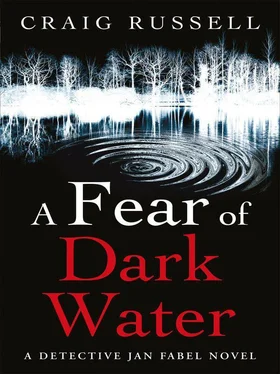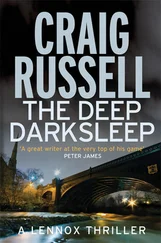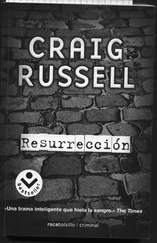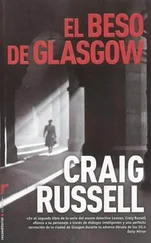Craig Russell - A fear of dark water
Здесь есть возможность читать онлайн «Craig Russell - A fear of dark water» весь текст электронной книги совершенно бесплатно (целиком полную версию без сокращений). В некоторых случаях можно слушать аудио, скачать через торрент в формате fb2 и присутствует краткое содержание. Жанр: Триллер, на английском языке. Описание произведения, (предисловие) а так же отзывы посетителей доступны на портале библиотеки ЛибКат.
- Название:A fear of dark water
- Автор:
- Жанр:
- Год:неизвестен
- ISBN:нет данных
- Рейтинг книги:5 / 5. Голосов: 1
-
Избранное:Добавить в избранное
- Отзывы:
-
Ваша оценка:
- 100
- 1
- 2
- 3
- 4
- 5
A fear of dark water: краткое содержание, описание и аннотация
Предлагаем к чтению аннотацию, описание, краткое содержание или предисловие (зависит от того, что написал сам автор книги «A fear of dark water»). Если вы не нашли необходимую информацию о книге — напишите в комментариях, мы постараемся отыскать её.
A fear of dark water — читать онлайн бесплатно полную книгу (весь текст) целиком
Ниже представлен текст книги, разбитый по страницам. Система сохранения места последней прочитанной страницы, позволяет с удобством читать онлайн бесплатно книгу «A fear of dark water», без необходимости каждый раз заново искать на чём Вы остановились. Поставьте закладку, и сможете в любой момент перейти на страницу, на которой закончили чтение.
Интервал:
Закладка:
‘Fine, Herr Senator,’ said van Heiden, also frowning: the idea of someone being late for an appointment was distressing. ‘I hope we haven’t kept you…’
‘No, no… not at all. It’ll be fine. Herr Fabel, could you see me out? I’d like a word, if I may.’
‘Sure…’
Hamburg’s police Presidium was designed as a cylinder, with an atrium in the centre and wings radiating out from it. The design concept had been to mirror a police star. As Fabel and Muller-Voigt walked along the curving hallway to the elevator, the politician made the usual small talk. Fabel was only going down two floors and they got into the lift together. As they did so, Muller-Voigt’s entire demeanour changed. It became agitated. Something that Fabel would never have associated with the Environment Senator.
‘Listen, Fabel. I need to talk to you. Urgently.’
‘What about?’
‘It’s a long story, but it is very very important. I really do need your help.’
‘I don’t understand. You mean professionally?’
‘Yes… no. Perhaps. But it is a matter of life or death. It’s something that, for the moment, I’d like to keep between ourselves. You’ll understand when we talk. Can you come to my house tonight? Around seven-thirty?’
Fabel held up the file. ‘I had planned to do some reading…’
‘This is more important, Fabel.’
They reached the Murder Commission’s floor and the doors opened. Fabel stepped out but placed a restraining hand to prevent the doors closing again.
‘If this is official business…’
‘Humour me, Fabel. I really need to talk to you. There’s no one else… Can you make it or not?’
Fabel looked at the Environment Senator for a moment. ‘I’ll be there.’ He let the doors close. As he walked along the corridor towards his office, the expression on Muller-Voigt’s face haunted him. He had never seen the politician ruffled before. Even on the occasion when Fabel had interviewed him as a potential murder suspect.
What bothered him was that Muller-Voigt hadn’t looked ruffled: he had looked downright scared.
Chapter Eleven
Niels Freese waited under a tree at the corner of the street, looking across at the cafe. He stood with a black sports holdall in one hand, his grip tight around its handle. He was dressed in a baggy dark combat jacket and jeans, with a black woollen hat perched on the top of his narrow, long head. The hat was actually a rolled-up ski mask, ready to be pulled down over his thin features when the moment came.
And the moment was coming.
He made a quick check that Harald was still in position, the engine of the stolen motorcycle ticking over. Then he closed his hand around the loaded automatic in his pocket and turned his attention back to the approaching Mercedes.
Niels Freese was twenty-eight and as angry as it was possible for a young man to be. Anger wasn’t really a big enough word, a broad enough concept, to describe what he felt as he stood there, waiting for the luxury car to park. He was a sighted man in a land of the blind. The wilfully blind. But there again, all his life, Niels had had a different way of seeing.
It was Niels’s anger and frustration that the Guardians of Gaia had been able to harness and give form and function. He was a walking — or limping — example of what Man’s arrogant abuse of the environment had done. The doctors had tried to tell him different, but he knew — he just knew — that it had been the chemicals in that factory where his mother had worked that had caused the problems with his birth; that had left him brain-damaged.
It was not that he was a simpleton: the damage had been neurological and had caused a slight palsy that had left him with his slight limp. But it was the other symptoms that had caused the problems. All of his life, he’d had difficulty processing information and reacting to his environment with immediacy. It had given him subtle ‘developmental problems’, as the doctors had described them. There was the deja vu. Everyone experienced deja vu sometimes but Niels experienced it every day of his life, sometimes as many as twenty times in one day. It was as if his wiring had all become entangled and short-circuited daily; at one stage his deja vu had blossomed into full-blown reduplicative paramnesia. As a young teenager, Niels had experienced depersonalisation episodes in which he had believed that he did not really exist. He also had experienced delusions that he was no longer living in his real home but in an exact replica of it, and that the replica was actually millions of light years distant from reality. He had been taken away for a while and treated in Hamburg-Eilbek Hospital’s psychiatric department. He had been treated with lithium and then with immunoglobulin and corticosteroids. The delusions faded without entirely disappearing, but Niels learned to cope with them. The deja vu remained as severe.
Niels’s mental illness had separated him from the others in his school and he had ended up friendless and isolated. Or almost friendless: there had been Roman, the fat boy who had also been a loner and had seemed weird even to Niels. They had not really liked each other, but there was some kind of recognised commonality.
It was after school, working for the forestry department, that Niels had become obsessive about the environment. He started to see his different way of perceiving the world around him not as a disability but as a gift. It was then that he realised that he, and perhaps only he, could see what was really happening to the world.
Niels looked up for a moment through the bare branches above him and at the sky beyond. The leaves had been late in coming out on all the city’s trees that year, but this specimen was not yet even showing signs of budding. It didn’t stand a chance here, thought Niels, its roots hemmed in by asphalt, its foliage strangled by fumes. The sky he looked at through the lattice of naked branches seemed to match exactly what Niels was feeling inside: an emotion even he would find almost impossible to describe. There was hatred and anger, and, greater than either, there was a colossal sense of frustration: frustration that others were oblivious to that which was so painfully, urgently obvious to Niels. But most of all, at the core of the emotion that burned inside him, was a raw grief: a mourning for a death he could foretell but seemed powerless to prevent. But if it was an emotion that was impossible to describe, it was possible to articulate. And he was seconds away from that articulation.
He turned his attention back to the Mercedes convertible. New, maybe only weeks old. Shiny. It pulled up and parked across the street. The man who got out of the car looked exactly like the kind of person you would expect to see parking an expensive status-symbol car outside a self-consciously trendy, artificially alternative cafe in the Schanzenviertel: he was in his mid-thirties, tieless and dressed in a designer suit that fitted with the car yet would look out of place in a traditional boardroom. He was all dot-com, right-on, designery, sunrise-businessy. Ten years ago he would have had a ponytail.
Niels despised these people even more than he hated the old guard. At least the old guard did not try to hide what they were. The old guard made it clear that they were about making money and keeping it from everyone else; they were visibly exclusive and conspicuously fuck-the-planet arrogant. These bastards — bastards like trendy Merc-Man — were much worse. They had exactly the same obsession with money and status, but they dressed it all up in a right-on, socially committed, environmentally friendly guise. They were fucking the planet just like the others, but they were doing it surreptitiously. Hypocritically.
Niels did not know the man who had parked the Mercedes. The Commander had not told Niels his victim’s name nor anything about him, but Niels hated him. Hated him with every fibre of his being. And soon he would get to vent that hatred: soon, Merc-Man would come to understand that every decision, every choice you made had consequences, no matter how ignorant you were of them.
Читать дальшеИнтервал:
Закладка:
Похожие книги на «A fear of dark water»
Представляем Вашему вниманию похожие книги на «A fear of dark water» списком для выбора. Мы отобрали схожую по названию и смыслу литературу в надежде предоставить читателям больше вариантов отыскать новые, интересные, ещё непрочитанные произведения.
Обсуждение, отзывы о книге «A fear of dark water» и просто собственные мнения читателей. Оставьте ваши комментарии, напишите, что Вы думаете о произведении, его смысле или главных героях. Укажите что конкретно понравилось, а что нет, и почему Вы так считаете.












